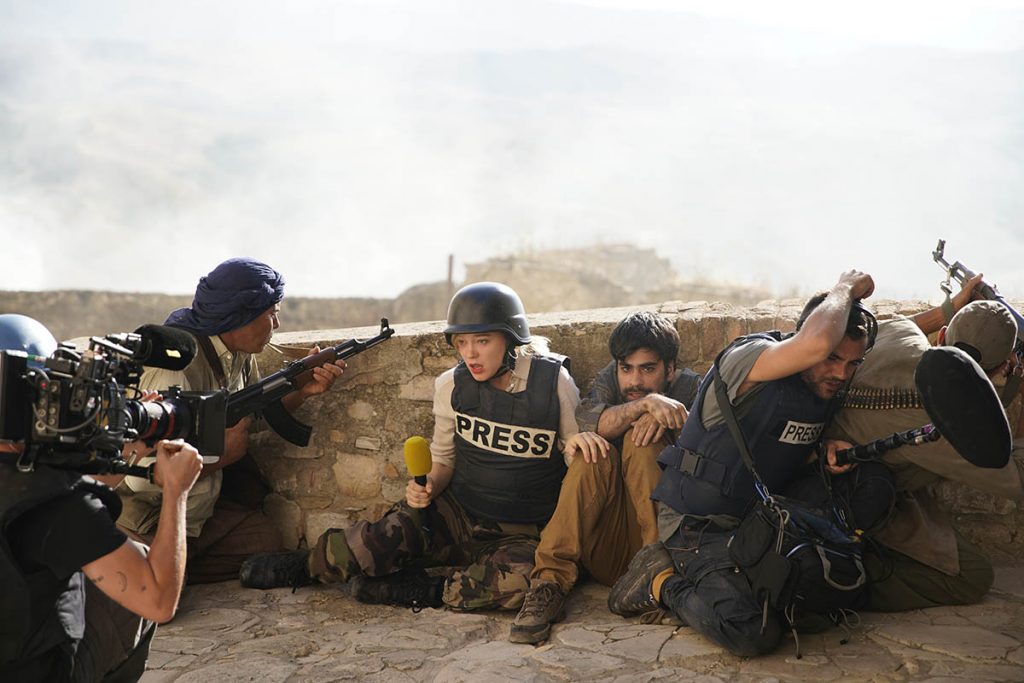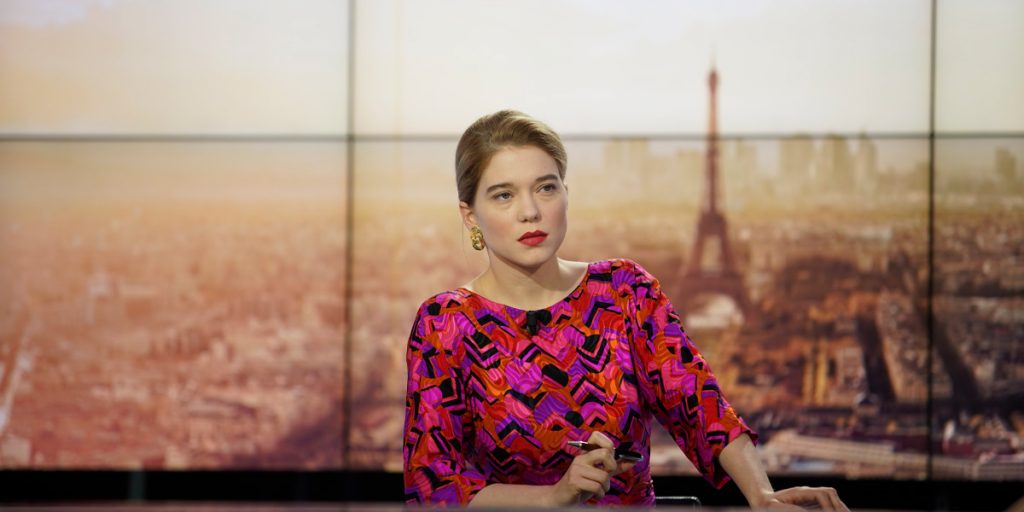France follows the tumultuous personal and professional life of a journalist after an accident threatens her carefully crafted onscreen persona.
A satirical drama exploring 24-hour news cycles and celebrity journalists, Bruno Dumont’s latest feature France follows the ups and downs of the onscreen and offscreen life of its titular protagonist, France de Meurs (Léa Seydoux). Enjoying a successful career as one of the country’s most popular news hosts, France’s life is suddenly turned upside down following an embarrassing traffic accident where she carelessly injures a young man named Baptiste (Jawad Zemmar). Feeling betrayed by the sudden negative press and public attention, France tries to rehabilitate her image by taking care of Baptiste and his family. Soon, France’s life begins to fall further apart after a series of turbulent events, including a brief affair with a dishonest journalist (Emanuele Arioli), quitting the business, and later making a dramatic return to her news career. Shaken by these events, France starts to reckon with the media landscape she is part of and how difficult it is to keep a stable sense of self in a culture driven by constant attention.
By the end of its occasionally clunky 133-minute runtime, it’s hard to tell exactly what France is about and what its clumsy storytelling is trying to achieve. As a piece of satire, it’s not particularly smart, sharp, or funny. Its messaging—exposing a media ecosystem driven by money, spectacle, and image—doesn’t present anything new or insightful. In one scene following an interview with a politician, France’s guest tells her, “Journalists’ demagogy surpasses that you accuse politicians of. You want figures, we seek voters. We’re the same, but you focus on profitability.” It’s quite a shocking line, not at all for the truth it reveals, but for just how obvious it is, spelling its talking points out to the audience as blatantly as possible. Perhaps the narcissistic, naive France needs it to be spelled out for her, but certainly not the film’s audience that deserves something more intelligent and creative.
Meanwhile, France’s dramatic moments aren’t any more satisfying. Far too often, the film stumbles over itself and it’s hard to stay engaged since it doesn’t seem to know where exactly it’s going. On more than one occasion, the film seems like it’s about to end, and then it keeps going on and on, until a confusing and oddly placed final scene gives way to the credits. Even more puzzling is the bizarre absence of one of its most important subplots—an affair that is never seen onscreen, perhaps to signify that it was so brief that it almost never even happened—but to our eyes is rendered invisible and almost irrelevant. When the consequences of the affair come back to haunt France, it’s hard to believe how significant it’s supposed to be since we never learn about it until after the fact.

Thankfully, France isn’t unwatchable. Léa Seydoux is clearly one of the film’s redeeming elements—her cold and guarded demeanor is a perfect fit for France’s carelessness and methodical narcissism. Even when the script renders France a bit enigmatic, Seydoux grounds her with an authentic emotional base that allows for unexpected moments of vulnerability. The film’s best moments appear when it really digs deep into France’s methodology, letting her character drive the story instead of the far too busy and obvious satirical ideas.
In one amusing scene, France interviews a group of Tuareg soldiers fighting ISIS and through the use of a translator, tells them how to pose for the camera. Playing the dual roles of director and star for her news program, we see her obsession with the image (and most importantly, the image of herself) at its most absurd. The news story about war and terrorism in North Africa isn’t about any of that, it’s all about her and making herself look good on television, just like a later scene when she directs her crew to film her in the middle of a firefight or on a refugee boat to be the star of the show. The real world suffering and violence aren’t the subjects of her news programs, but rather the sets and props to provide an exciting, dangerous, sensational backdrop. And when we see her film her reports, she asks her cameraman to reshoot better takes—her appearance and monologues onscreen have to be perfect, after all.
Even if France’s storytelling isn’t very compelling, its visuals remain engaging. The crisp, vibrant color palette not only keeps the film easy to look at, but also perfectly mimics the bright, attention-grabbing aesthetic of cable news shows. And in an age where nearly every European drama film has the same drab, digital realist look, France thankfully avoids that style and instead opts for something closer in tune with the world it is trying to portray. Also striking is the film’s production design, most memorably the dark and intense chambers of France’s apartment with the dramatic paintings on the walls and the impossibly tall doors. Here, the dwellings of the rich and famous aren’t spaces of luxurious freedom, but rather prisons of decadence and formality, we’re shown. Celebrity life, like France’s carefully constructed image on television, isn’t as glamorous as it’s made out to be, and crumbles so easily.
France is now available to watch on digital and on demand in the US and select countries. In the UK, the film will be released exclusively on MUBI on December 29, 2022.

